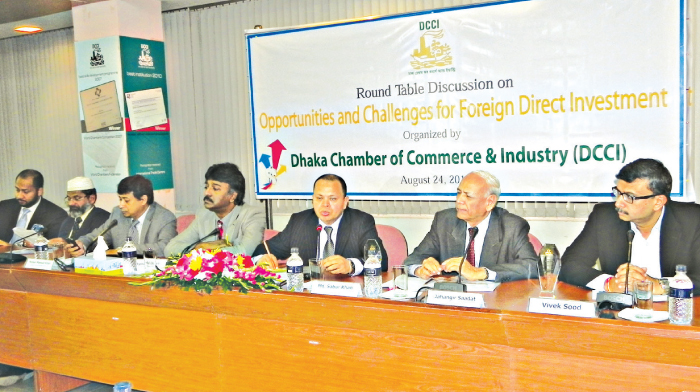News >> Business
Instability, corruption, improper policy deter FDI: businesses
 25 Aug, 2013
25 Aug, 2013
Businesses at a seminar on Saturday said political instability, corruption and absence of a proper policy were the main challenges Bangladesh was now facing in attracting foreign direct investment to the country.
At the seminar on opportunities and challenges of the foreign direct investment organised by the Dhaka Chamber of Commerce and Industry, they said deviation from rule of law was a very negative signal to the investors across the world.
Vivek Sood, chief executive officer of Grameen Phone Ltd, said there were three very critical matters for FDI in Bangladesh and those were transparency, stability and regulations.
‘At this moment, the tax on telecommunication services is highest in Bangladesh. It’s an obstacle to any future foreign investment in this sector,’ he said.
Vivek said that receiving licence was not the lone important matter for any enterprise but whether it could use natural resources like gas and oil was a very much important issue for it.
Bangladesh can be a very attractive destination for FDI, if the country addresses some challenges in a very consultative manner, he added.
Andrew De Garis, president of Santos Bangladesh, urged maintaining politically congenial atmosphere for attracting more FDI.
He also suggested that the government should formulate an energy regulatory policy.
Mozibur Rahman, chief executive officer of Bangladesh Foreign Trade Institute, said shortage of land now was one of the major concerns of Bangladesh in attracting FDI.
He proposed setting up of more special economic zones and developing infrastructure extensively in the country.
Mozibur said, ‘We should give more emphasis on establishing deep-sea port to facilitate FDI and export activities.’
DCCI president Sabur Khan said,
‘FDI brings not only fund but also new technology, new avenues of knowledge, training of manpower and market expansion faciliy.’
He said ‘Bangladesh has huge potential to attract FDI especially in RMG, telecommunication, electronics, automobiles, IT and ITES, energy, transport, healthcare and banking sectors but we have to ensure sustainable investment-friendly environment.’
To attract more FDI, Bangladesh needs to remove bureaucratic inertia, reform policies, ensure conducive policies, land acquisition and availability, energy and power security and political stability, Sabur said.
Korean Export Processing Zone president Jahangir Saadat presented the keynote paper in the seminar and said that Bangladesh could be the best FDI friendly country in South Asian countries due to its geographical location but there were some challenges like bureaucratic inertia and land requisition problem.
He alleged that some regulators were delaying implementation of a private EPZ project of Youngone Group which is the first foreign direct investor in the garment export industry in Bangladesh.
Jahangir said a good number of foreign investors were interested to invest in the Korean EPZ but they wanted assurance of registration and mutation of land.
‘It’s a big barrier to FDI that the government has announced the Korean EPZ as a zone but they (the government) are not executing the deed of handover of acquired land in favour of the zone and mutation in its name is yet to be done,’ he said.
DCCI former presidents Sayeeful Islam and Hossain Khaled, former director RI Khan, and Dutch-Bangla Chamber of Commerce president Shahzada A Hamid took part in the open discussion session.
Source: new age

